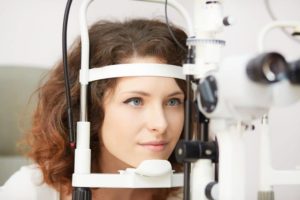Prevent Blindness has designated April as Women’s Eye Health and Safety Month in an effort to educate women about the steps they can take today to help preserve vision in the future.

Ladies, as you enjoy this change of seasonal weather, we invite you to also consider the “seasonal” changes occurring in your own bodies — especially those related to the health and longevity of your eyesight. The sobering statistic is that, “Women are at higher risk than men for most eye diseases, yet one in four has not had an eye exam in last two years,” according to a study conducted by Prevent Blindness.

Unfortunately, the significant hormonal fluctuations experienced over the course of a woman’s life can negatively impact eye health. Additionally, the natural aging of eyes is more prevalent among women simply because women tend to live longer than men; this statistic means that (generally speaking) women have more time than men to develop eye diseases such as glaucoma, cataracts, and Age-Related Macular Degeneration (ARMD).
More specifically, research shows that women-specific factors —many having to do with changes in hormone levels— can have a significant impact on eye health:
- Autoimmune diseases: Women are more likely to experience lupus, multiple sclerosis (MS), rheumatoid arthritis, and Sjögren’s syndrome (this destroys the glands in the eye and mouth that produce moisture). These diseases can impact the eye negatively.
- Birth control/HRT: These may cause blood clots and strokes which can cause vision problems. Birth control/HRT can also increase women’s chances of cataracts and dry eye.
- Fertility drugs: Women who take fertility drugs may experience spots in their vision.
- Pregnancy: There are several changes that take place in a woman’s body during pregnancy, and eyes are not left out. Dry eye syndrome, light sensitivity, prescription changes, and eye puffiness are the most common eye problems seen in pregnant women. Migraines are common in pregnant women, which can cause light sensitivity. Higher blood pressure during pregnancy can cause blurry vision and retinal detachment.
- Breast cancer: Drugs taken to treat or prevent breast cancer can increase your risk of cataracts, eye bleeds, itchy eyes, and light sensitivity.
- Menopause: Women who undergo menopause may experience dry eye syndrome and uveitis (eye inflammation).

- Choose Healthy Foods. Increasing water consumption and including foods in your diet which contain beta-carotene, lutein, lycopene, omega-3 fatty acids, vitamin C, vitamin E, zinc, and zeaxanthin will help you maintain healthy vision. (See this month’s SNEAD Healthy Eye Recipe here.)
- Quit smoking. Smoking increases chances of eye disease immensely.
- Reduce consumption of sodium and caffeine.
- If you are pregnant, visit your eye doctor a couple times during your pregnancy (and soon afterward) to discuss any vision changes.
- Most importantly: Receive annual eye exams. Only an eye care professional, such as those at Snead Eye Group, can accurately monitor your vision status.